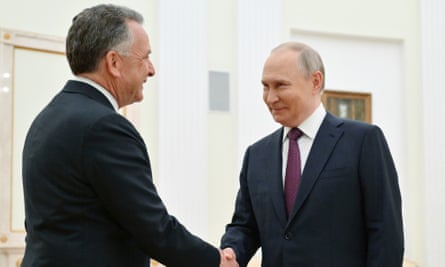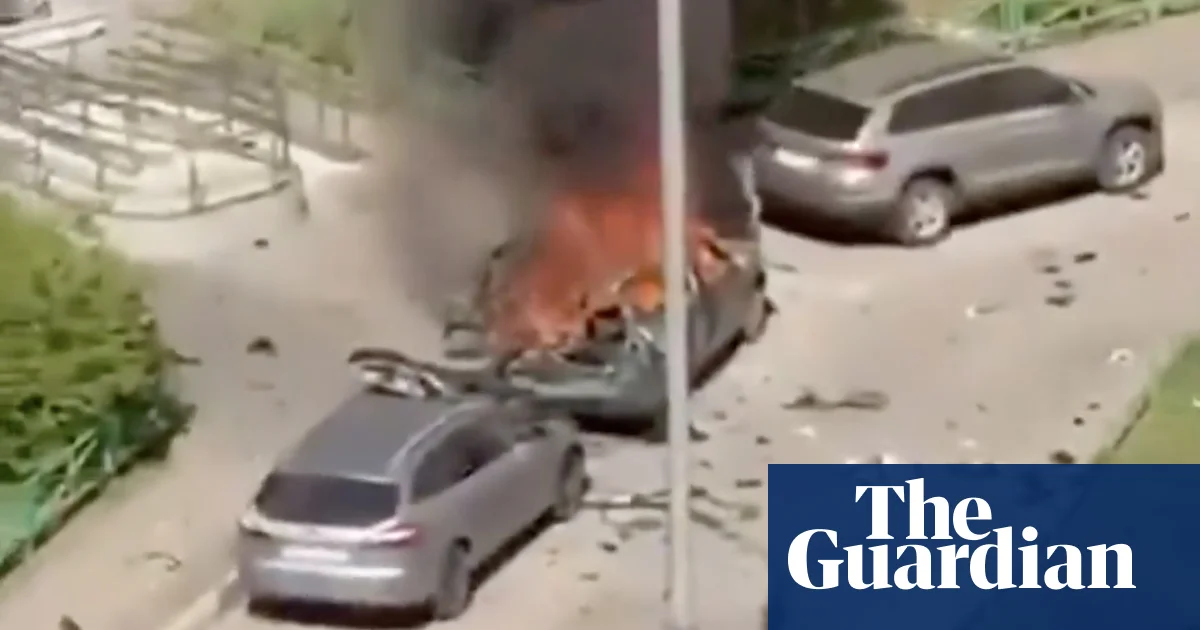A senior Russian military official has been killed in a car explosion near Moscow, as Vladimir Putin began his high-stakes meeting in the Kremlin with Donald Trump’s special envoy Steve Witkoff.
The Russian authorities named the officer as Lt Gen Yaroslav Moskalik, the deputy head of the main operations directorate of the general staff of the Russian armed forces.
The blast appeared to be similar in nature to previous attacks on Russians that were later claimed by Ukraine and could cast a shadow over Friday’s talks between Moscow and Washington.
The Kremlin published a short clip showing Putin and Witkoff shaking hands and exchanging pleasantries before sitting down on opposite sides of a white oval table to start their meeting behind closed doors. Putin was flanked in the meeting with Witkoff, who holds no formal diplomatic credentials, by his top foreign policy adviser, Yuri Ushakov and investment envoy Kirill Dmitriev.
Trump has played up Witkoff’s visit – his fourth to Russia in recent months – claiming that a peace deal is within reach. “The next few days are going to be very important. Meetings are taking place right now,” Trump told reporters on Thursday.
“I think we’re going to make a deal … I think we’re getting very close.”

Russian president, Vladimir Putin (right), with Donald Trump’s special envoy Steve Witkoff on Friday. Photograph: Kristina Kormilitsyna/AP
Reuters on Friday published two sets of documents outlining the US and Ukrainian proposals for ending Russia’s war in Ukraine, revealing significant differences on key issues ranging from territorial concessions to sanctions.
The latest apparent Ukrainian assassination deep inside Russian territory is also unlikely to sit well with the Trump administration, which has been desperate to show tangible progress on peace before Trump’s 100th day in office next week.
Despite Putin’s refusal to agree to a ceasefire and continued missile strikes on Ukraine, the US president has repeatedly criticised Volodymyr Zelenskyy over stalled peace talks, while adopting a more cautious tone toward the Russian leader.
The Russian investigative committee said the explosions were caused by the detonation of an improvised explosive device packed with shrapnel. The committee, which investigates major crimes, said it had opened a criminal case.
Baza, a Telegram channel with sources in Russia’s law enforcement agencies, said a bomb in a parked car in the town of Balashikha in the Moscow region had been detonated remotely when the officer, who lived locally, walked past.
A video circulating on Russian social media captured the moment the car exploded, while additional images showed the vehicle completely burnt out.
Kyiv has not yet commented on the incident.
Since the start of the full-scale invasion, Ukraine has targeted dozens of Russian military officers and Russian-installed officials whom Kyiv has accused of committing war crimes in the country. Little is known, however, about the clandestine Ukrainian resistance cells involved in assassinations and attacks on military infrastructure in Russia and Russian-controlled areas.
Last December, Ukraine’s security services targeted another senior Russian general who was killed after an explosive device hidden in an electric scooter detonated outside an apartment building in Moscow.
At the time, Keith Kellogg, Donald Trump’s appointed special representative for Ukraine and Russia, criticised the killing of Lt Gen Igor Kirillov, saying it could violate the rules of warfare.
Apart from military figures, Ukraine has targeted prominent Russian pro-war propagandists including Darya Dugina, the daughter of an ultra-nationalist Russian ideologue, who was killed in 2023 when a bomb blew up the Toyota Land Cruiser she was driving.
Moskalik, 59, was part of several high-profile Russian foreign delegations in recent years, including in at least two rounds of talks with Ukraine and western officials in 2015 and 2019, as well as a 2018 visit to the Assad regime in Syria.
Insiders close to the defence ministry say his influence within the Russian military was on the rise.
Mikhail Zvinchuk, a popular Russian military blogger with ties to the defence establishment, said: “According to chatter behind the scenes, one scenario for personnel reshuffling at the general staff had Moskalik being considered as a potential head of the national defence management centre, primarily due to his methodical approach and thoughtfulness.”
